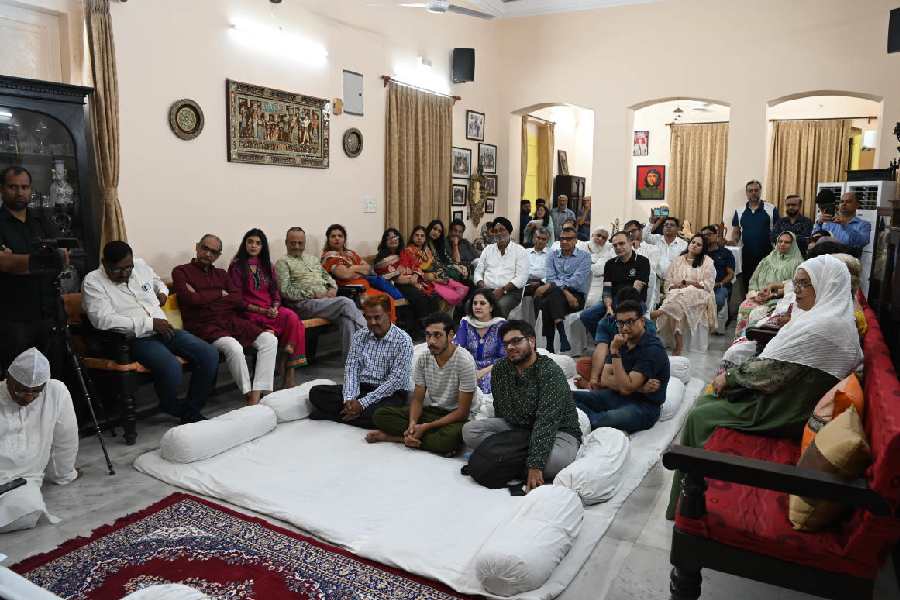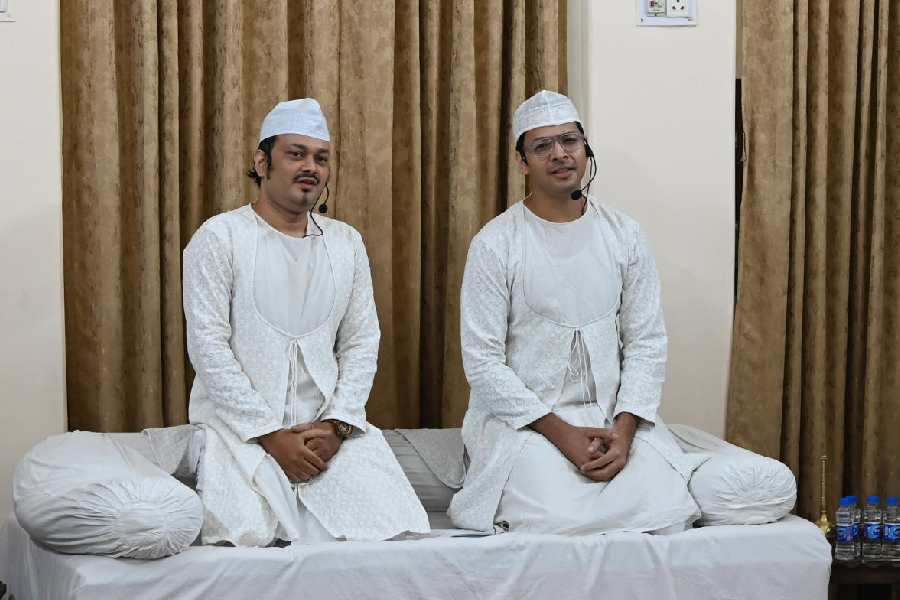An old woman once requested Prophet Muhammad to advise her grandson to control his obsession with sweets. The Prophet asked them to come back a few days later. When she did, the Prophet told the boy that eating too many sweets was not good for health. Surprised by the simplicity of his advice, the woman asked the Prophet why he did not tell the boy the same thing the first day. The Prophet replied that he was not eligible to advise the boy that day because he himself was very fond of sweets. But in the days in between, he exercised control. A person’s example is more powerful than just his words.
Heart-warming anecdotes from the Prophet’s life were shared with a Calcutta audience in an ancient but endearing style on Tuesday.
An evening of dastangoi — the traditional art of Urdu storytelling that flourished in the Mughal court — was held at a central Calcutta home that is close to 200 years old.
Dastangoi is a derivation from dastan in Persian, meaning story, and goi, meaning to tell.
Two young men — dastangos or the storytellers — dressed in white chikan angarkhas teamed with white caps sat on an elevated couch, their legs folded. One of them was Zahid Hossain. The other one was Palash Chaturvedi, a Hindu Brahmin.
“We are very fortunate that we live in a state where this can happen,” Mudar Patherya, a communications consultant, social worker and the organiser of the programme, said at the outset. The audience, a mini-Calcutta made of people from many faiths, bore testimony to his assertion.
The evening was titled Chaar Sikkay (four coins) — the name borrowed from another story shared by Hossain and Chaturvedi.
The wealth that came to the Prophet’s home would be distributed among the needy every night. One day, the Prophet was unwell and his family members, fearing a late-night emergency, decided to keep aside four coins and gave away the rest of the wealth. Before going to bed, the Prophet enquired if everything had been given away. He was then told about the four coins. The Prophet said Allah, who had provided for them during the day, would also look after them at night. He asked his family members to distribute the four coins among the needy as well.
The dastangos spoke in Urdu laced with Hindi, using contemporary and often contextual references, without being preachy.
Chaturvedi quoted Irish playwright and political activist George Bernard Shaw as saying that “the world needs a person like (Prophet) Muhammad. Whatever I have read about him, he was not against Christianity. He was for all humanity”.
They attributed a lot of misinformation about the Prophet to “WhatsApp University”.
The performance, which lasted around 50 minutes, received a loud applause.
Gaurav Pandey, director of films like Shukno Lanka and Hanuman Dot Com, was in the audience. “Both the context and the content are important. To project Islam as a religion of peace in the India of 2023 is a very bold and very important step,” he told this newspaper.

The evening of dastangoi at a central Calcutta home on Tuesday
Chaturvedi, one of the two dastangos, said it was important for a Hindu to be a part of such an exercise.
“It is extremely important. We fail to acknowledge the presence of other ideas. But the new generation is trying to go back to their roots (of pluralism). They are more interested in the original Ramayan than Adipurush (the film),” he told Metro.
Hossain and Chaturvedi are the founders of the East India Dastangos, which aims to revive the old form. Fuad Halim, doctor and CPM leader and his wife, rights activist Saira Shah Halim, hosted the programme at their Kyd Street home, built in 1829.
“The discourse was engaging. The jurisprudence and conquests of the Prophet are well known. But the qualities that endeared him to one and all need telling and retelling,” said Fuad Halim.
